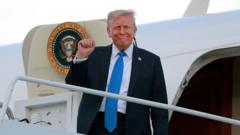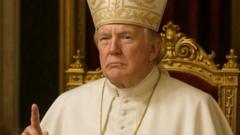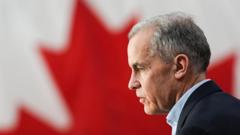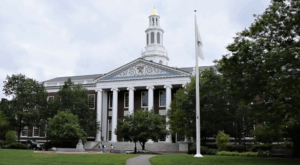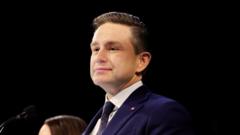In a recent interview, Trump made it clear that he does not intend to run for a third presidential term, emphasizing a commitment to constitutional limitations. Despite his previous remarks hinting at a desire for extended service, he attempted to downplay those comments as mere provocations against the media. The interview has reignited discussions regarding the 22nd Amendment, which restricts U.S. presidents to two terms, while leaving some supporters speculating about potential loopholes.
**Trump Denies Plans for Third Presidential Term Amid Speculations**
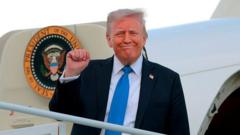
**Trump Denies Plans for Third Presidential Term Amid Speculations**
Former President Trump dismisses rumors of seeking a third term in office, asserting he will stick to two terms per constitutional regulations.
In parallel, Trump addressed economic issues, maintaining a positive outlook despite criticism stemming from his tariff plans that have seemingly stalled economic growth. Although questioned about certain immigration policies violating due process, he defended his administration's actions as aligned with legal advice. Talks of using military force in foreign policy, especially regarding Canada, were also downplayed by Trump, affirming diplomatic intentions.
**
In an interview aired on NBC's Meet the Press, Donald Trump stated categorically that he will not pursue a third presidential term, reaffirming his belief in the constitutional two-term limit. The former president said, “I’ll be an eight-year president, I’ll be a two-term president,” hinting that any previous suggestions of extended tenure were made to provoke the media. Speculation surrounding his potential candidacy for the 2028 election has increased, evidenced by merchandise being sold under the slogan “Trump 2028.”
Trump addressed the growth of support for a third term but clarified, “This is not something I’m looking to do,” while also acknowledging notable Republicans who could step in his place. He referenced the legal implications of the Constitution’s 22nd Amendment that limits presidential terms, asserting it would take considerable political maneuvering to change this law.
While discussing tariffs, Trump maintained that his economic policies remain on track, dismissing concerns regarding a shrinking economy as a part of a "transition period." He proposed that a reduction in consumer goods variety shouldn’t instill worry among the populace.
When questioned about his administration's adherence to due process in immigration policy, Trump sidestepped the criticisms, affirming the employment of competent legal counsel. The conversation also touched on foreign relations, particularly regarding Canada, where Trump stated he does not foresee military action, framing it instead as a matter of national fairness.
Ultimately, this interview reflects the peculiar landscape of American politics, with Trump navigating pressures from both his base and broader public opinion amidst constitutional fidelity discussions and ongoing economic scenarios.
**
In an interview aired on NBC's Meet the Press, Donald Trump stated categorically that he will not pursue a third presidential term, reaffirming his belief in the constitutional two-term limit. The former president said, “I’ll be an eight-year president, I’ll be a two-term president,” hinting that any previous suggestions of extended tenure were made to provoke the media. Speculation surrounding his potential candidacy for the 2028 election has increased, evidenced by merchandise being sold under the slogan “Trump 2028.”
Trump addressed the growth of support for a third term but clarified, “This is not something I’m looking to do,” while also acknowledging notable Republicans who could step in his place. He referenced the legal implications of the Constitution’s 22nd Amendment that limits presidential terms, asserting it would take considerable political maneuvering to change this law.
While discussing tariffs, Trump maintained that his economic policies remain on track, dismissing concerns regarding a shrinking economy as a part of a "transition period." He proposed that a reduction in consumer goods variety shouldn’t instill worry among the populace.
When questioned about his administration's adherence to due process in immigration policy, Trump sidestepped the criticisms, affirming the employment of competent legal counsel. The conversation also touched on foreign relations, particularly regarding Canada, where Trump stated he does not foresee military action, framing it instead as a matter of national fairness.
Ultimately, this interview reflects the peculiar landscape of American politics, with Trump navigating pressures from both his base and broader public opinion amidst constitutional fidelity discussions and ongoing economic scenarios.





